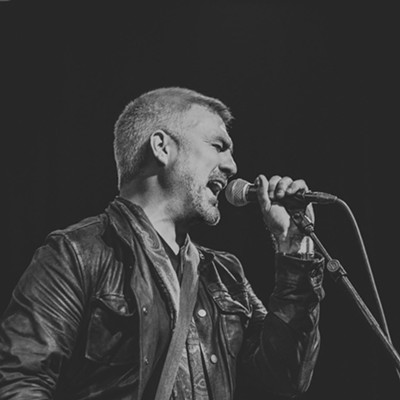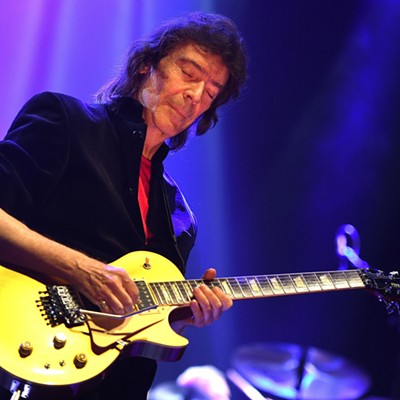The jigs, dirges and reels from centuries ago are played as pristinely in Boston as they are in Kilkenny--unless you add the rapid fire of a punk guitar and drum set.
It's an energetic combination that made the Boston-based Dropkick Murphys what they are today. With underground beginnings in 1996, they were Celtic-punk triumphant at the Vans Warped Tour 2003, companions to the venerable Sex Pistols and Reverend Horton Heat. They are now headlining at the Rialto Theatre with the Unseen and Roger Miret & the Disasters Sept. 9. Their latest album, Blackout, hit the not-so-underground market in June.
"We're excited about this record," said lead vocalist Al Barr. "We think it's our finest work to date. We hope that people concur. We've done our part, and now it's up to them to decide. Will they embrace it? Or will they be repulsed? We will see."
There's nothing repulsive about a spirited album that reads the minds of every St. Patty's Day drunk with a song like "Kiss Me I'm Shitfaced," a whimsically cynical tune about fame and getting laid. Meanwhile, traces of beauty surface, such as guest vocalist Stephanie Dougherty's graceful voice in "Dirty Glass."
Blackout also has a serious side with songs like "Worker's Song," in which bagpipes and a bodhran (traditional Celtic drum) echo in the background, Big Country style, as Barr powerfully bleats the classic anthem's chorus: "We're the first ones to starve, we're the first ones to die/the first ones in line for that pie in the sky/and we're always the last when the cream is shared out/for the worker is working when the fat cat's about."
It must be fun pissing on the British class system and the subjugation of the working class while live on stage with the Sex Pistols. It's the all-Irish Dropkick Murphys' specialty, which is probably why Woody Guthrie's daughter Nora approached the band to set some wicked melodies to her legendary father's unpublished lyrics.
Hence, "Gonna be a Blackout Tonight," a classically simple Guthrie-esque commentary on war penned in 1942--but belted out a la Murphys--has the appeal to make older generations clap and modern punks mosh.
"It was an ominous and daunting task. Hopefully he's not spinning in his grave somewhere," said Barr.
Nay, laddie. Guthrie and Joey Ramone are up in musician heaven smiling down on a band that can merge folk with the short, frenetic, aggressive, confrontational punk music culture and make a mandolin, tin whistle and accordion sound tough.
Rooted in the sounds of the Clash, the Pogues, AC/DC and Stiff Little Fingers, the Murphys had humble beginnings, yet they enthusiastically re-ignited the punk community's lust for hardcore Irish traditional. With Al Barr and Ken Casey (who also plays bass) at the vocal helm, Matt Kelly (drums and bodhran), James Lynch (guitar), Marc Orrell (guitar and accordion), Ryan Foltz (mandolin, tin whistle, and dulcimer) and Scruffy Wallace (bagpipes), the Murphys created an irresistible sound that sold 150,000 copies of Do or Die, the band's 1998 debut full-length.
The mainstream music world still dumped on the band for a while, but exchanges between Barr and Casey grew in popularity and formed the signature voice for albums like The Gang's All Here and Sing Loud, Sing Proud. Before long, fans worldwide developed a passion for their style of hometown anthems and whiskey-soaked melodies.
The guys sound like they really are in a Boston pub, mugs of Guinness held high, while singing the traditional "Black Velvet Band" in this latest offering. Starting off quiet and jovial, the sound explodes by the second stanza. Yet the Blackout sound maintains a level of maturity easily explained by their front man.
"I'm 35 years old," said Barr. "I've been into punk rock since I was a kid, since I was 14, 15, 16 years old. I consider myself young at heart, but my wife and I are getting ready to have our first child in December. So, I mean, it's not the same as it was for me years ago. I also think punk has changed a lot. It's not what it was."
Indeed, the ancestral New York Dolls-loving-CBGB's-loitering punks never really migrated west to influence modern compact-car-driving, suburban, professionally colored-and-styled punk wannabes.
"Wannabes are better than someone who doesn't want to be at all. You gotta start somewhere. Not everybody's born cool; you know what I'm saying? I know I wasn't," said Barr. He imparts such wisdom on fans while touring, making it a point to meet a few people on the road to keep it all in perspective.
Remembering a time early in punk's history when 20 people at a show was a good turnout, performing for the masses doesn't faze them. Even with a huge fan base, a lack of pretension is clear in their heartfelt music, as rhythmic as the rolling Irish hills and yet as strong as the blue collar workers and rebels who inspired it.







